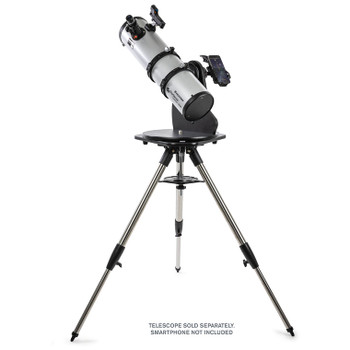Description
Sky-Watcher Heliostar 76mm H-Alpha Solar Telescope
Introducing the Sky-Watcher Heliostar 76mm H-Alpha Solar Telescope
The Heliostar 76mm H-alpha Solar Telescope brings a new light (yes, pun intended) to the Sky-Watcher family by offering a dedicated Hydrogen-alpha (Hα) solar telescope to the lineup. Hydrogen-alpha solar observing allows you to unlock the incredible dynamics of surface of the Sun far beyond what a white light solar filter can deliver. From solar prominences on the limb of the Sun (often mistakenly called 'flares'), to active sunspot regions, bright plage patches, surface granulation, wispy, snake-like plasma filaments, and more, the star of the solar system is yours to capture in breathtaking views and images.
Just in time to catch solar maximum in 2025!!
- Double stack performance, single stack price
- 76mm aperture
- 630mm focal length
- f/8.3
- Official solar telescope of the Charlie Bates Solar Astronomy Project
- Integrated Heliostar solar finder, tube rings, and carry handle
- Integrated Triffid Tuner and Solis Etalon Technology
- <0.55Å bandpass
- H-alpha fully multicoated lens
- Achromatic doublet design
- 2-inch dual-speed Crayford focuser
- 11.5mm, 1.25” diagonal format blocking filter
- Weight: 8.4 lbs.
- Includes: OTA, mounting rings, V-style dovetail, clip-on Sun shade, 20mm 70° 1.25" eyepiece, camera phone adapter, hard-shell carrying case
Double the Fun
The Heliostar 76mm Hα Solar Telescope provides incredible double stack performance for the price of one etalon filter. There is no need for costly double stack systems, Heliostar 76Hα is tuned to <0.55Å natively providing rich surface detail and with its 76mm aperture high resolution viewing and imaging is easily obtainable.
Safety Information
The Sky-Watcher Heliostar 76mm H-Alpha Solar Telescope has been lab tested here in the United States to meet the ISO 12312-2 safety standards. Each scope is tested one by one on the actual Sun to make sure each unit is ready for safe solar viewing right out of the box.
This is a dedicated solar telescope and will not provide views or images of anything except for the Sun. Please use an abundance of caution when observing the Sun as incorrect usage and practices can result in serious and even permanent eye damage.
Also, the 11.5mm blocking filter in the removable eyepiece diagonal is part of Heliostar's safety features. Do not use with any other type of diagonal.
What's In the Box?
The Heliostar 76Hα features a collection of accessories to ensure you are ready for viewing out of the box. The telescope includes mounting rings, V-style dovetail, Heliostar solar finder, dual speed Crayford focuser, 11.5mm blocking filter, clip on sunshade, 20mm 70° 1.25” eyepiece and a camera phone adapter to snap quick pictures to share with your friends. All of this is housed inside a rugged carrying case, so you are ready to take your Heliostar 76 anywhere. A perfect match for the Sky-Watcher SolarQuest mount for the ultimate, portable solar telescope setup!
Hydrogen Alpha Technology
Hydrogen Alpha (Hα) solar telescopes are specialized instruments used to observe the Sun in a specific wavelength of light—656.3 nm—which corresponds to the red line in the Balmer series of hydrogen’s emission spectrum. This wavelength is critical for studying solar phenomena like prominences, filaments, sunspots, and solar flares in great detail. Unlike standard white-light telescopes, which capture the Sun's broad spectrum, Hα solar telescopes offer a window into specific solar activity in the chromosphere, a layer of the Sun's atmosphere located just above the photosphere.
Etalon Filter Technology
At the heart of most Hydrogen Alpha solar telescopes lies the etalon filter, a highly precise optical device that isolates the Hα wavelength from the rest of the Sun’s emitted light. An etalon is a type of interferometer, consisting of two parallel mirrors separated by a precise distance. The etalon works by reflecting light multiple times between the mirrors, selectively allowing only wavelengths that satisfy specific resonance conditions to pass through.
In the case of Hα solar telescopes, the etalon is designed to transmit light at the Hα wavelength while blocking all other wavelengths. The key to the etalon’s performance lies in its ability to tune the wavelength it transmits. This is achieved by adjusting the distance between the mirrors or by slightly tilting the etalon, which changes the interference conditions. This tunability is crucial because the Sun's emission at Hα can shift slightly due to Doppler effects as material moves across the Sun’s surface and atmosphere.
There are two primary types of etalon filters used in solar telescopes: single etalon and double etalon systems.
Single Etalon: A single etalon filter typically has a narrower bandwidth, providing high contrast for detailed solar observations but at the cost of limiting the field of view. This makes single etalon systems well-suited for viewing small, high-contrast features like prominences or filaments.
Double Etalon: A double etalon system uses two etalon filters in tandem to improve the wavelength selectivity, reduce the overall bandwidth, and enhance the contrast and image clarity across a wider field of view. Double etalon systems are preferred for more detailed solar studies because they can offer both a sharper image and better tunability, allowing for a more accurate depiction of solar dynamics.
Solis Etalon Technology: Sky-Watcher's Solis technology allows the Heliostar to achieve a 0.55A bandpass without the costly expense and complexity of a second etalon to achieve the same performance. This allows the observer to obtain detailed images of the solar disk right out of the box without any further expense.
Trifid Tuner: Inside the Heliostar is Sky-Watcher's Trifid tuning system. This tuner applies physical pressure to the etalon plates allowing the observer to reach the desired Hydrogen-band. The Trifid tuner uses three support veins to provide a secure tuning for the etalon.
First shipments are expected early 2025. Pre-Order Only.





















